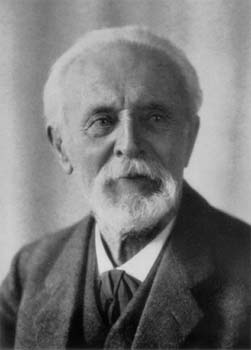Heinrich Kayser facts for kids
Quick facts for kids
Heinrich Kayser
|
|
|---|---|
 |
|
| Born |
Heinrich Gustav Johannes Kayser
16 March 1853 |
| Died | 14 October 1940 (aged 87) |
| Citizenship | German |
| Alma mater | Sophie Gymnasium (Berlin) University of Strasbourg University of Berlin |
| Known for | Helium in the Earth's atmosphere, spectra, kayser unit |
| Awards | ForMemRS |
| Scientific career | |
| Fields | Physicist, Spectroscopy |
| Institutions | Technische Hochschule, Hannover University of Bonn |
| Doctoral advisor | Wilhelm Roentgen |
| Influences | Hermann von Helmholtz Gustav Kirchhoff Carl Runge |
Heinrich Gustav Johannes Kayser was a German scientist who studied physics and spectroscopy. He lived from 1853 to 1940. He made important discoveries about light and how it helps us understand different elements.
Contents
About Heinrich Kayser
Heinrich Kayser was born in a town called Bingen am Rhein, Germany. From a young age, he was very interested in how things work, especially light and sound.
Early Discoveries
Kayser's early studies focused on sound waves. But he soon became famous for his work with light. In 1868, during a solar eclipse, he made an amazing discovery. He noticed a new "spectral line" in the light coming from the sun. A spectral line is like a unique fingerprint that different elements leave in light. This new line showed him that helium was present in the Earth's atmosphere. This was a big deal because helium had only been found on the sun before!
In 1881, Kayser also came up with the word "adsorption". This word describes when one substance sticks to the surface of another. Think of how a sponge soaks up water, but instead, it's just the surface that holds onto something.
Working with Light Patterns
Kayser worked closely with another scientist named Carl Runge. Together, they spent a lot of time studying the "spectra" (light patterns) of many different chemical elements. By carefully looking at these patterns, they could learn a lot about what elements were made of. Their work helped other scientists understand the building blocks of the universe.
Later in his career, in 1905, Kayser also wrote an important paper about electron theory. Electrons are tiny particles that are part of every atom.
The Kayser Unit
Because of his important work with light and spectra, a special unit was named after him. This unit is called the "kayser". It is used to measure something called "wavenumber", which helps scientists describe light waves.
Heinrich Kayser passed away in 1940 in Bonn, Germany. His work greatly helped us understand light and the elements around us.
Published Works
Heinrich Kayser wrote a textbook called Lehrbuch der Physik für Studierende. This book was for students learning about physics.

